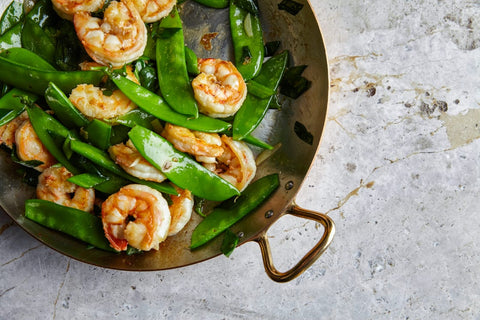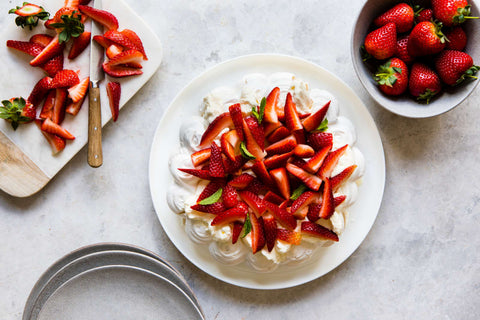If your energy levels start to dip anywhere between 2 and 4 p.m., you’re not alone. That midafternoon slump was not uncommon in a normal work environment, but with many people working from home so close to the bedroom, nap time has become more enticing.
When there’s no time in the day for a nap, though, many reach for a cup of coffee to fix their fatigue. While it might up your energy levels for a bit, caffeine can lead to another crash later on. For lasting energy, focus on anti-inflammatory foods and certain spices, like these:
Foods to boost energy.
One reason for fatigue is chronic low-grade inflammation, which can be caused by several factors, including obesity, depression, and chronic pain.
When inflammation is present in the body, less energy is available to the brain. That’s because low-grade inflammation flips off a metabolic switch in the chemical pathway that produces energy. The result is not only lower energy but an increase in toxic free radicals that damage brain tissue and reduce insulin sensitivity.
Because of this cycle, foods that increase inflammation can decrease your energy availability. To reduce inflammation, it is important to eat an anti-inflammatory diet. The central tenets of an anti-inflammatory diet are as follows:
- Your brain is made up of 60% fat. In order to perform at its best, it requires a constant supply of omega-3-fatty acids. That includes at least 2 to 3 grams of EPA (eicosapentaenoic acid) and DHA (docosahexaenoic acid) per day.
- Reducing omega-6 fatty acids is key to maintaining the correct balance of omega-3s to omega-6s. Eating an excess of omega-6s can trigger the body to produce chemicals that spike inflammation.
- A diet rich in colorful, nonstarchy vegetables adds polyphenols, which fight inflammation through a number of processes.
- When you are on an anti-inflammatory diet, you must stabilize insulin by eating whole, plant-based foods rich in healthy fat and natural chemicals. Eat vegetables such as cauliflower, green beans, and broccoli.
If you follow these tenets, your body will be less inflame and you will feel more energized and rejuvenated. Advertisement
What to eat.
Foods high in polyphenols:
- Nonstarchy vegetables
- Cloves
- Star anise
- Cocoa powder
- Mexican oregano
- Dark chocolate
- Chestnuts
- Flaxseed meal
- Black and green tea
- Blackberries
- Muscadine grape seeds
- Apple cider vinegar
- Cinnamon
- Superfruits, like the maqui berry
Healthy fats:
- Avocados
- Olives
- Chia seeds
- Coconut
- Hazelnuts
- Macadamia nuts
What to avoid.
Omega-6 fatty acids found in oils such as:
- corn
- safflower
- sunflower
- grapeseed
- soy
- peanut
- vegetable, which also includes mayonnaise, many salad dressings, and most processed and fast foods
Spices to boost energy:
Capsaicin
Capsaicin is the compound in chili peppers that makes them spicy. In addition to adding a delicious burn to food, it has been shown to reduce fatigue in mice. In humans, consuming 2.5 mg of capsaicin per meal (7.68 mg/day) has been shown to restore the energy balance in the body.
Capsaicin affects energy because it affects glucose metabolism in the body. When capsaicin enters the gut, it triggers a vagal response to the brain, thereby regulating appetite by helping hormones from the brain’s appetite regulation center more effectively detect when enough is enough.
The amount of capsaicin varies widely among different types of peppers, and it’s proportional to how spicy the chili tastes. For example, a mild jalapeño: 0.165 to 0.33 mg of capsaicin; serrano chili: 0.396 to 1.518 mg of capsaicin. Spicier chilies like Thai bird’s-eye chilies and habaneros can be an efficient way to get capsaicin (if you can handle them).
Rather than trying to add up capsaicin levels, just try to incorporate more spicy foods into your diet. Use extra cayenne pepper in your cooking, and if you order in Thai, Indian, or other spicy foods, order them one level spicier than you normally would.
Bear in mind that it’s not just generic “spiciness” that matters, but the capsaicin itself. In other words, spicy foods that derive their burn from non-capsaicin compounds, like mustard, horseradish, black pepper, and ginger, do not affect energy balance in the same way.
Black cumin
In one study in rats, Nigella sativa seed, commonly known as black cumin, helped fatigue after exhaustive swimming. It is known to be neuroprotective due to its antioxidant properties. It also increases acetylcholine in the brain, which helps your muscles contract.
Though this is a very promising spice, we need more data, especially from human studies, to consider it effective. Still, it can’t hurt to integrate it into your food. You may see it sold as nigella seeds, onion seeds, or kalonji (the Hindi name). It can be used in Indian naan bread, Bengali potato stir-fry, and preserved lemons.
Turmeric
Curcumin, the active ingredient in turmeric, has been found to increase muscle glycogen content in mice. Glycogen is an important energy source. In humans, it may help in the management of exercise-induced inflammation and muscle soreness, thus enhancing recovery and performance in active people. Just 100 mg of curcumin can improve fatigue.
Keep in mind: If you are persistently fatigued, it is important to see a doctor, as fatigue can be rooted in many serious medical conditions such as heart and thyroid disease. When these have been ruled out, though, nutrition is a good place to start thinking about how to raise your energy levels.
Below is a spicy weeknight dinner recipe that may do the trick. The shrimp are a great way to get a dose of seafood and capsaicin in your diet. You can add a bit more cayenne pepper if you prefer your food spicier. Pair it with nonstarchy vegetables, like broccoli, snap peas, green beans, bell peppers, etc., for a stir-fry, or place on top of a salad.
Spicy Shrimp Recipe
(gluten-free, dairy-free)
Servings: 1
Prep Time: 20 minutes
Cooking Time: 5 minutes
Ingredients
- 8 medium shrimp, peeled and deveined, tails left on
- ½ teaspoon ground cumin
- ½ teaspoon cayenne pepper
- ½ teaspoon ground turmeric
- ¼ teaspoon black pepper
- ¼ teaspoon garlic powder
- 1 teaspoon kosher salt
- 2 tablespoons olive oil
Method
- In a medium bowl, toss the shrimp with the cumin, cayenne pepper, turmeric, black pepper, garlic powder, and salt.
- Heat the oil in a cast-iron skillet over medium heat.
- Add the shrimp and stir-fry until they are cooked through and pink on the outside, about 3 minutes.




